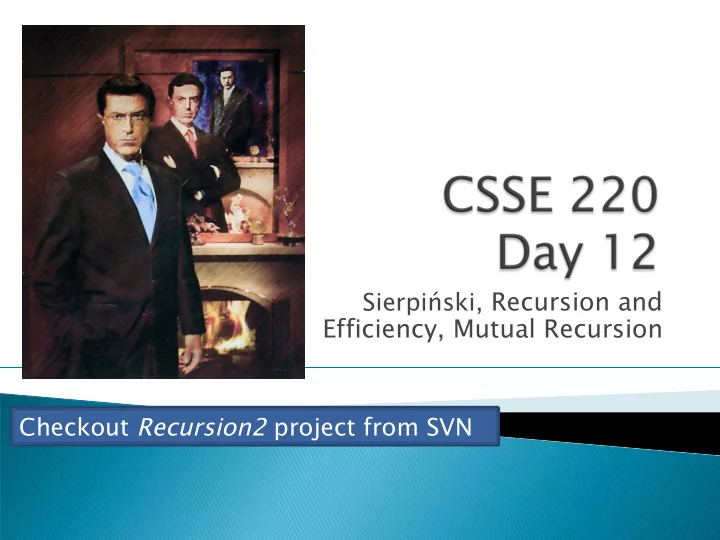

Sierpi ń ski, Recursion and Efficiency, Mutual Recursion Checkout Recursion2 project from SVN
} Any method that calls itself ◦ On a simpler problem ◦ So that it makes progress toward completion ◦ Indirect t recursion: May call another method which calls back to it.
} When implementing a recursive definition } When implementing methods on recursive data structures } Where parts of the whole look like smaller versions of the whole Q1
} The pros ◦ easy to implement, ◦ easy to understand code, ◦ easy to prove code correct } The cons ◦ Sometimes takes more space and time than equivalent iterative solution ◦ Why? because of function calls Q2
} Always have a bas base cas e case e that doesn’t t recurse } Make sure recursive case always makes prog progres ress, by so solving lving a a smaller smaller pro roblem lem } Yo You gotta tta believe ◦ Trust in the recursive solution ◦ Just consider one step at a time
HW 11 & 12: Sierpinski Triangle
} Why does recursive Fibonacci take so long?!? } Can we fix it? Q3
} Save every solution we find to sub-problems } Before recursively computing a solution: ◦ Look it up ◦ If found, use it ◦ Otherwise do the recursive computation Q4
} A deep discovery of computer science } In a wide variety of problems we can tune the solution by varying the amount of storage space used and the amount of computation performed } Studied by “Complexity Theorists” } Used everyday by software engineers
} 2 or more methods call each other repeatedly ◦ E.g., Hofstadter Female and Male Sequences ◦ In how many positions do the sequences differ among the first 50 positions? first 500? first 5,000? first 5,000,000? http://en.wikipedia.org/wiki/Hofstadter_sequence Q5
HW 12: Sierpinski Carpet Q6-7
Recommend
More recommend